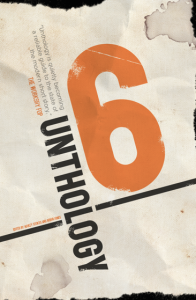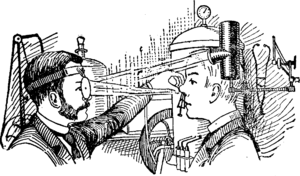Unthology 6
I’m over halfway through Unthology 6, edited by Ashley Stokes and Robin Jones, and published by Unthank Books. I’ll complete this post when I’ve finished reading all of them (done!) and I might add a few thoughts as the stories resonate.
It’s an anthology that captures the imagination because it’s a true adventure, you really don’t know where you’ll be going next. As I was reading, I realised that the book also seems to be organized so that, if you start at the beginning and read in order, you undergo an emotional journey. That’s what I’ve found, anyway, and I’ve decided to write this on the basis of that, an emotional response. I’ll write a paragraph about each story so you see what I mean.
Psycho-Nasal Aggravation Syndrome – Gordon Collins: This is a wonderful, funny story, not so much for the actual problem PNAS (writing as someone who has to deal, on a regular basis, with the nasal hair of her O.H., – are you shocked? – I’m with Tim Sykes’ mum on this, it’s an unromantic procedure even though I quite enjoy using the little electrical gadget and the brief wielding of power). Anyway, the humour, for me, comes from Dr Salan and his serious fascination and expertise in the nasal area. Very funny and surreal way of dealing with the ageing process which is good because ageing is surreal and not at all funny.
The Story with Yuliya Has a Bad Ending – Alexandros Plasatis: This is shocking and angry. We’re dipped in a metaphorical bath of acid in Kavala in northern Greece. The voice, that of the apparently psychotic Rasool telling the story in a bar, is brilliant, the story is harrowing and you feel beaten up by it.
Egor – Daisy Lafarge: The story of a woman who begins a relationship with a man whom she doesn’t find interesting. Her life is arid; she is devoid of lust for anything. This story slows the pulse as the woman makes a desperate effort to engage with experience.
Daughter, God Daughter – Chrissie Gittins: A sad, gentle story about isolation that slackens the pace even more because it needs to be read slowly. Here, a woman deals with the death of her god-mother whom she loved. There are some beautiful descriptions of gardens and cake, and it makes me imagine that life is a garden that must go on, and perhaps what’s left is a cake that must be sliced.
Ceum na Caillich – Neil Campbell: We’re shocked again as we visit the Isle of Arran and are taken on a walk which Libby hates because her husband always insists on going to the same places, never anywhere new. By accident, she is forced to deal with the unexpected. The result is devastating and we’re absolutely part of that confusion and terror.
Kiss on a Thread – Matthew Temple: A very short story in which the rhythm and language teeter on the verge of narrative poetry. Set during a disco at a party for the parents-to-be, the main protagonist’s mistress turns up. It is a story fuelled by lust, hate and anger and is terribly beautiful.
Blue – Roelof Bakker: A very short but devastating story of loneliness experienced by a man on the tube. This is a man so isolated that he longs for the jerk of the train so that, when he falls into a stranger’s lap, he might feel the safety of human contact. Extraordinary and desperately sad.
Killing with Kindness – Ailsa Cox: A complex story that switches viewpont, slips through time and demonstrates the confusing terror and mess of life. It concerns experience and innocence, love and distance and all this, and several troubling stories, are constructed around an attempt to save a beached whale. What can I say? It slices you up.
This is How Danger Approaches Me – Georgina Parfitt: Set in one moment, it s about a woman trapped by illness and reliant on her daughter for pretty much everything. Her life is on hold and she feels abandoned. All she can think about is what the future might hold for her precious daughter. She is living life through her daughter and the effect is powerful and desolate.
Shadows – Robert Anthony: This surreal story is laugh-aloud funny and at the same time devastatingly tragic. It reminds me of Flann O’Brien’s ‘The Third Policeman’, partly because of the dead-pan looniness, and also the horror. It’s about a man who has received a shadow from ‘the religious people down at the mall’. It’s a story where the man’s wife adds spoonfuls of Death to their meals, and where Death tastes minty. I won’t say more because it’s brilliant and you must read it.
The Novel Factory – Luke Melia: This, too, is five-star funny and mixes a formal story-telling voice with some brilliantly daft ideas. Adita Singh of Chitwan, Nepal is engaged to repair (cut and paste) water-damaged copies of ‘Great Expectations’ using a dodgy copy of Microsoft Word. It is also a poignant love story. It is very funny and a little bit sad with more than a touch of desperation.
The Girl – Victoria Hattersley: A disturbing story about a man who has confused reality with gaming and with all the fantasy images with which we’re all bombarded everyday. His clumsy attempt to talk to the girl has devastating results.
Do you see what I mean about the emotional journey? The voices are sharp and so are the edges to the stories. Spiky. Glittering. I’m looking forward to reading the rest of the stories over this week. I wonder how it will end. So until next Sunday…
Sorry, I’m a bit late. Life was busy over the weekend. The final third has been a riveting read. Here goes.
Power Surge – Graeme Finnie
This is a long story filled to the brim with decadence and corruption. Set in Bridgeport, USA, against a backdrop of the Kennedy government, the Cold War, Cuba etc, it begins with a wonderful smoking scene. I always love a smoking scene, and here you really get a taste of those strong old Camels. Disillusioned and worn out, Johnny Miller decides to participate in an experimental study of memory for which he’ll be paid $4 plus 50c carfare. It is not how he expected. The story is peppered with records of the experiments and Johnny turns out to be fragile, manipulated, a small cog in the big machine. It reminds me a bit of Kafka’s ‘The Castle’ as far as that goes. I found it to be grimly pleasurable immersing myself in this film noir world, peopled by characters from an Edward Hopper painting. It’s dark and horrifying.
Graeme Finnie has written about the story’s background and about the actual psychological experiments, conducted by Stanley Milgram in the 1960s, that inspired the story. It’s on the Unthank website here.
Stalemate – Simon Griffiths
Set in a nursing home, the irascible Henry has spent his life humiliated having been forced to work in the mines during WW2 instead of fighting. Always fascinated by technology, Henry has never been able to follow this dream. His has been a life diverted. But his carer, Sean, takes him on a trip to Bletchley, and an opportunity arises for Henry to change. I like Sean; his kindness is refreshing. You don’t get to read about good people very often. It is a story about the possibility of change, always. The character of Henry is complex, and the positive message is delicately tinted with regret.
Niagara Falls – James Wall
Sean features in this story too, but here he’s an ex-girlfriend’s ex-boyfriend, not the same Sean at all, but this story is also about missed opportunities, a romantic one in this case. We can all do a spot of private investigating nowadays. I happen to know several people who admit to indulging in a little bit of innocuous cyberstalking to see what ex-boyfriends might be up to now. You know who you are!!! Here a romance ensues, and I’m not going to give away the outcome because it is devastating. The image of Niagara Falls, the rushing, pounding, falling water, adds a dimension and works incredibly well.
And the pace of the book increases as we near the end…
Hay. Pee. Ah. Wrist – Jonathan Pinnock
Brief and amazing! When you enter the mind of this character, you have to put a great deal of your own mind on hold. At first you can’t analyse because you don’t understand what’s happening. You’re taken on a journey of word association and apparent manic lunacy. It’s stimulating and very much like listening to music because your emotions are cleverly manipulated and shocked when you realize where you’ve been, what’s going on and where you’ve turned up. I needed to use my music listening skills to get the title. I’m not going to give any of it away. Sorry. It’s a short journey and you need to go on it. It concerns insects and a father.
Everything Changes, Nothing Perishes – Tim Sykes
As above, this story concerns insects and a father. Here, Father is not dead, he’s pupating which is a very Schulzian concept, a big plus as far as I’m concerned and I could go on about that because the story has lots of Schulzian elements, but I won’t blather on. I suppose it’s also Kafakaesque, the story does refer to Kafka, so obviously it has surreal elements . The story is also very funny. I love the decription of the motorway journey when the main character murmurs the petrol and diesel prices as he drives and attempts to stay in front of a woman in a Fiesta so he can watch her in his mirror. In this story Father is a ‘poet in stone’ and his children have always aligned him with his work, the craggy sculptures that fill the house, but people are never that simple. Although there’s sadness and regret about life, change, stagnation, death, mistakes and incomprehension, it’s also incredibly hopeful. Juggle the words of the title to see what you might come up with if it were a different story.
So, this final story is the concluding journey of a life and it’s a beautiful and wonderful way in which to end the anthology, and that’s because you end up with a glorious image in your mind, and yet, you are entirely mystified. So, what else is there for you to do but start over, begin afresh, read something else and see if you’re dazzled again.
It’s been a gripping read. The book is full of surprises and encountering such diversity has kept me pleasurably alert. I’ve travelled through a spectrum of emotions, settings, and styles. I definitely feel that I’ve come to the end of a book, and strangely, I can relate the final story to the first one as you do when you’ve finished reading a novel, and that’s worth doing. It really does pack a punch when you think about the beginning and all that’s ensued and the final image and so on. You’ll have to read it to understand properly but it’s powerful. Hats off to the editors, Ashley Stokes and Robin Jones, on a remarkable achievement.


















Great picture of Dr Salan, Amanda. Glad you liked my story. Gordon
Hi Gordon, you wouldn’t believe what I had to google to find that! Loved your story. Thanks for dropping by.
Good morning Amanda
Really appreciate your review of my story “Power Surge”…believe me there was so much cigarette smoke in the early drafts you could hardly see the page. Perceptive of you to pick up on the Hopperesque nature of the scenes – his work was on my mind when I was writing – those isolated figures inhabiting lonely motel rooms and half empty diners, with their suggestions of chance encounters or missed opportunities, shadowy streets and half lit rooms all invite some form of drama to unfold. Of course truth being somewhat stranger than fiction, the urge behind the story comes from the actual experiments conducted by Stanley Milgram in the 60s in Bridgeport and elsewhere – there’s a short piece about them on the Unthank blog if you’re interested.
Graeme
Hello Graeme,
Yes, great story!I loved the Hopperesque atmosphere. Clever of you to imply it. Thanks for the info about the actual experiments. I’ll take a look and put up a link. It’s always fascinating to hear about the motivations behind a story. By the way, have you given up smoking or something? Aha, I’ve just read your article on the Unthank website and see why you did it. Makes me want a good strong Camel.
Amanda